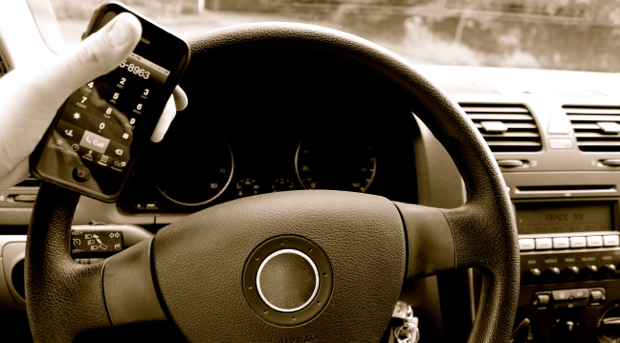Put Down The Phone: The Legal Battle Against Distracted Driving
The headlines are almost weekly: car wrecks, injured passengers, one or more dead. The most cited culprit? Distracted driving. The increased use of cell phones has invaded nearly every sphere of life, including the confines of four-door sedans or family mini-vans. To many drivers, that long commute seems like the perfect time to call someone you’ve been meaning to get in touch with, check the daily lunch specials at your favorite restaurant, or even figure out which direction to drive on I-40. The U.S. Government’s official website for distracted driving reports that in 2010 alone, 3,092 people were killed in crashes involving a distracted driver and an estimated additional 416,000 were injured in motor vehicle crashes involving a distracted driver. This report also states that drivers who use hand-held devices while driving are four times more likely to get into a crash, while texting and driving creates a scenario where a crash is twenty three times more likely. These sobering statistics have been the driving force behind a nationwide campaign for states and towns to enact laws and ordinances banning certain, if not all, aspects of cell phone use.
North Carolina does not have a ban on hand-held device use, meaning you can still talk on your phone while driving, unless you are a driver under the age of eighteen or a bus driver. However, all drivers, regardless of age or status, are banned from texting while driving in North Carolina. [Source: Insurance Institute for Highway Safety, http://www.iihs.org/laws/CellPhoneLaws.aspx] However, Chapel Hill recently became the first municipality in the state to pass a local ordinance completely banning the use of cell phones while driving. No talking, no GPS locating, no hands-free devices, and absolutely no texting. The ordinance passed on March 26, 2012, and was scheduled to go into effect June 1, 2012. Supporters praised the ban as a groundbreaking effort to limit one of the leading causes of deadly car crashes. Others criticized the ordinance, arguing it was too strict and should have been enacted at the state level, if at all. Chapel Hill city council member Donna Bell commented on the importance of the ordinance in leading the state towards similar measures. “I wish it was coming from the state, but it doesn’t seem like the state is going to do it at this point, and if they take on the example of little Chapel Hill, I’ll be perfectly happy with that,” Bell said. The ordinance has limits, as it does not permit police to stop drivers solely for talking on their cell phone. But if a driver is stopped for another reason and that driver also happened to be using a cell phone, they will be charged a twenty-five dollar fine.
Despite some opposition, the ordinance seemed to be on the fast track to enforcement. However, the first challenge came on May 8, 2012, when the Superior Court of Orange County issued a preliminary injunction preventing enforcement of the ordinance. The motion for preliminary injunction was filed by George King, owner of George’s Towing and Recovery in Chapel Hill. Chapel Hill’s towing ordinance provides that King must call the police prior to the removal of any car from private property, which forces King to use a cell phone while driving to ensure his business is both effective and legal. This requirement was directly at odds with the new cell phone ban, and according to the Superior Court judge, caused the Plaintiff “irreparable harm.” It was ordered that the towing ordinance and the cell phone ban not be enforced.
A main issue in the battle between King and the town of Chapel Hill is whether Chapel Hill has the authority to enact such a ban. Counties are creatures of the state and as such, only have the power to enact ordinances so long as they are consistent with state and federal law. Harris v. Board of Comm’rs of Washington Cty., 274 N.C. 343, 346 (1968), N.C. Gen. Stat. § 160A-174 (2011). “’[M]unicipal by-laws and ordinances must be in harmony with the general laws of the State, and whenever they come in conflict with the general laws, the by-laws and ordinances must give way.’” State v. Williams, 283 N.C. 550, 552 (1973) (quoting Town of Washington v. Hammond, 76 N.C. 33, 36 (1877)). In other words, if North Carolina already has statutory authority in place addressing the use of cell phones while driving, the town of Chapel Hill does not have the power to enact an ordinance that conflicts with the state statute.
In his complaint, King alleges that General Statutes §§ 20-137.3 and 20-137.4 preempt Chapel Hill’s cell phone ban. These statutes provide for the “Unlawful use of a mobile phone by persons under 18 years of age” and the “Unlawful use of a mobile phone,” respectively. Assistant Attorney General Jess Mekeel agreed with King and stated, “An ordinance by the Town of Chapel Hill regulating motorists’ use of cell phones is preempted by State law, and therefore, unenforceable.”
There has not yet been a ruling on preemption and the enforceability of the ordinance, but that will most likely be an issue raised if the battle between King and Chapel Hill continues. But the ruling will certainly influence other counties around the state as they approach the dangers of distracted driving. Russ Stephenson, Raleigh Mayor Pro Tem, comments on the need to address distracted driving in North Carolina’s counties. “With the proliferation of communications technologies inside cars, both brought in and built-in, distracted driving will be a growing problem,” said Stephenson.
In the coming months, municipalities across the state will no doubt turn a watchful eye toward the Triangle, as the legal battle against distracted driving is far from over. One can only hope that while respecting the parties’ interests and legal precedent, safe driving is deemed the victor.

